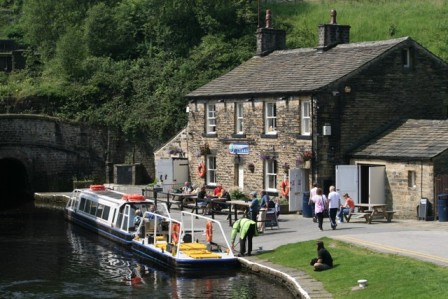A gentle jam: canal traffic stacks up
Proper conduct is observed
Making the cut
Sixty years after the nation’s canal network was brought into private ownership the publication of British Waterways’ annual report has created a media storm (well their chief executive was on the Today programme and there was a small article in the Guardian’s business section). In the first of three articles, Mick Owen investigates the issues surrounding life on ‘the cut’, its politics and its people.
A gentle jam: canal traffic stacks up
Proper conduct is observed
Canals don’t lend themselves to media storms; you can’t rush to the barricades in a narrowboat. Apart for the stricture that you should avoid creating a wake when boating – to reduce the risk of erosion – the whole atmosphere of canals is languorous. Canal people are relaxed; they don’t rush, not even when they are annoyed. Take a look at any marketing material from one of the dozens of canal boat holiday companies trying to survive the economic downturn and the words you meet are “wind down”, “peace”, “tranquillity” and the ubiquitous “relax”. It’s a curious USP on which to build a business but canals are big, big business.
According to BW there are 31,000 leisure boats on the waterways with eleven million people “visiting for a range of activities including angling, cycling, walking, going to a waterside pub or simply to feed the ducks”. Indeed one of the key points of debate within the diverse waterways community is whether this explosion of interest, a 13% increase in foot traffic in one year and more boats on the water than at the height of the Industrial Revolution, is ‘a good thing’. It certainly creates tensions, as a recent BW advertisement shows. In partnership with Transport for London, the agency is looking for someone who is good with people and can ride a bike to take on the role of towpath warden on the Regent’s and Grand Union canals in the heart of the capital. Significantly, however, the new warden will “be skilled at resolving conflicts and dealing with difficult situations” as they seek to make “sure that proper conduct in observed” while “resolving any issues arising between cyclists and pedestrians”.
Anyone who has had dealings with the coarse angling fraternity will be surprised that they do not feature in this list of likely protagonists alongside joggers but clearly the move to open up the towpaths is causing as much aggravation as the drive to get the actual canals in use. With 200 miles of new or restored waterway opened in the last ten years, British Waterways are keen to keep the boom going despite the credit crunch, although their need to fund these developments while maintaining existing routes is beginning to cause cracks in the veneer of cheery, canal-borne bonhomie.
With so many people using the waterways, it is no surprise that there is a plethora of organisations, magazines and websites serving their need for news, information and gossip. And all seem exercised by BW’s custodianship. On the headlines page of the excellent Narrowboat World website 50% of the news pieces have “British Waterways” in the title, with the agency’s recent announcement that 77 unlicensed boats have been physically removed from the waterways in the first six months of the year in pride of place. Although this initiative gets guarded support, the general attitude to BW seems to be one of cynicism born of long, disappointing experience. Every initiative is dissected, every press release examined for artifice, every positive story pulled apart and its negative flipside exposed.
In fact, the closer you look, the more tensions and conflicts you come across. Owners of shiny, new wide-beams look down on the New Age hippies living in scruffy old boats on permanent moorings; long-term cruisers look down on shareholders who can only manage three or four weeks a year on ‘their’ boat; and everyone looks down on hire-boat yahoos banging their way up and down the waterways and mooring in winding holes (and you really shouldn’t do that!). Without a marine version of Debrett’s or a degree in social anthropology the exact nuances of these hierarchies must remain a mystery.
With so many different users the canal system must be groaning under the weight of their varied expectations. For some a canal or its towpath is simply a route from A to B. For others it’s a nice day out with the excuse of taking in some ‘heritage’. Heritage is a business in its own right and BW are not slow to exploit it at place such as Standedge high in the Pennines outside Huddersfield. Standedge Tunnel is the M62 of its day. Linking Lancashire and Yorkshire, it is essentially a long, wet horizontal hole in the ground but such is the power of the heritage genie that the café at the Yorkshire end – where you can board an electric barge and experience the longest, deepest and highest tunnel in the UK – is a honey pot for school groups, tourists of all nations and the essential family market. Along with gems such as the Falkirk Wheel, the Anderton Boat Lift and the Ponycysyllte Aqueduct, the tunnel is drawing more people, and so more potential conflict of interests, towards the waterways. Although they bring their leisure pounds, it’s not obvious whether this is the wisest of strategies.
What is obvious is that ‘the cut’ is a significant contributor to the economy of any community it passes through and leisure managers of all shades would do well to recognise its potential. British Waterways concern themselves with leisure, heritage, regeneration and commerce. How many of us who work in any of those areas concern ourselves with waterways?
Mick Owen is managing editor of The Leisure Review
The Leisure Review, August 2008
© Copyright of all material on this site is retained by The Leisure Review or the individual contributors where stated. Contact The Leisure Review for details.
